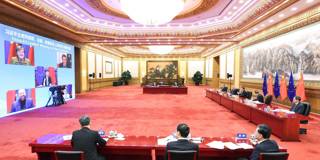Over the past eight years, the climate outlook has darkened, and the Paris climate agreement has come to seem like a pipe dream. But China is demonstrating that sustainable development is still possible, both as a matter of domestic policy and in international negotiations.
LONDON – One of the most memorable lines in cinema, Rick Blaine’s farewell to Ilsa Lund in Casablanca – “We’ll always have Paris” – evokes both nostalgia and a sense of longing for unattainable ends. It has thus become an ideal refrain within international climate governance circles. Everyone remembers that high point in late 2015, when 192 countries adopted the Paris climate agreement and committed to keeping average global temperatures below 2° Celsius (and preferably within 1.5°C) of pre-industrial levels.
But in the intervening years, the climate outlook has darkened, and the Paris agreement has come to seem like a pipe dream. The science makes clear that economic growth based on fossil fuels cannot continue if we want to keep the 1.5°C target alive. According to the International Energy Agency, country-level emissions-reduction targets, known as nationally determined contributions (NDCs), still fall far short of what is needed, and “most pledges are not yet underpinned by near-term policies and measures.”
Nonetheless, China, the world’s second-largest economy, has steadily increased its targets and implemented the policies needed to reach them. In its first NDC, submitted in 2016, it pledged to achieve peak carbon dioxide emissions by 2030. Then, ahead of the 2021 United Nations Climate Change Conference in Glasgow (COP26), it submitted an updated NDC in which it committed to reach carbon neutrality by 2060.
To that end, China has increasingly aligned its national development plan with the Sustainable Development Goals, including by establishing the world’s largest carbon market. Over the past decade, the Chinese economy grew at an average rate of 6.2%, but its annual energy consumption grew by only 3%, on average, and its CO2 emissions per unit of GDP fell by 34.4%.
China’s climate-oriented development has also supported its objective of becoming a responsible stakeholder in the global economy. One manifestation of this aspiration is the contentious EU-China Comprehensive Agreement on Investment. When it was concluded in December 2020, after seven years of negotiations, the CAI was the most ambitious agreement that China had ever reached with a third party. It also marked the first time that China had accepted robust sustainable-development provisions in a trade agreement.
To be sure, the CAI has since been put on ice, following a vote by the European Parliament to suspend the ratification process. But since it reaffirms both Chinese and European commitments to invest in a cleaner economy, it could be revived in the future. If it is eventually ratified and implemented, it will stand out as a model of how a free, fair international trade system can be leveraged to help tackle the climate crisis.
The 2020s have been declared the crucial decade for the global transition to carbon neutrality by mid-century. To keep doing its part, China will need to increase its ambitions as an emerging world leader in multilateral, plurilateral, and bilateral trade and investment negotiations and agreements. It is well positioned to drive progress in the World Trade Organization’s Structured Discussions on Trade and Environmental Sustainability, and by pursuing closer cooperation with WTO member states and other parties.
Similarly, China has much to gain by reviving plurilateral WTO negotiations (launched in 2014) toward an Environmental Goods Agreement. This would eliminate tariffs on “products that can help achieve environmental- and climate-protection goals, such as generating clean and renewable energy, improving energy and resource efficiency, controlling air pollution, managing waste, treating wastewater, monitoring the quality of the environment, and combating noise pollution.”
In an era of heightened international tensions and global rebalancing, climate change will amplify geopolitical volatility. Political maps could be redrawn by any number of factors, including rising sea levels (which could eliminate territory); water shortages (which could cause crop failures, hunger, and civil unrest); and the global race for energy resources and other critical supplies (many of which lie in regions that are vulnerable to climate-driven instability).
These proliferating threats to peace and security call for increased investment in resilience and immediate action to address the security implications of climate change. Unfortunately, in 2021, a Russian veto prevented the UN Security Council from adopting a draft resolution that would have established climate‑related risk as a central component of UN conflict‑prevention strategies. But recognizing climate change as a security issue is an important step toward achieving a more coherent global approach to reversing the climate crisis. Here, too, China is well placed to bring about a different outcome, in this case by applying pressure on its northern neighbor.
Given China’s size, its net-zero strategy is the most important of any country in the world, and it is likely to unfold faster than almost anywhere else, too. Other countries could learn a lot from China’s domestic sustainable-development policies, and China’s increasingly ambitious foreign policy could help keep the rest of the world on track to achieve the Paris objectives. But much will depend on how it acquits itself over the next few years.
China and all other countries must come to terms with the implications of climate change for international security and stability, and they must find more ways to work together on a shared vision of decarbonization and sustainable development. If they do, the best days of climate governance will lie ahead of us, not behind.






LONDON – One of the most memorable lines in cinema, Rick Blaine’s farewell to Ilsa Lund in Casablanca – “We’ll always have Paris” – evokes both nostalgia and a sense of longing for unattainable ends. It has thus become an ideal refrain within international climate governance circles. Everyone remembers that high point in late 2015, when 192 countries adopted the Paris climate agreement and committed to keeping average global temperatures below 2° Celsius (and preferably within 1.5°C) of pre-industrial levels.
But in the intervening years, the climate outlook has darkened, and the Paris agreement has come to seem like a pipe dream. The science makes clear that economic growth based on fossil fuels cannot continue if we want to keep the 1.5°C target alive. According to the International Energy Agency, country-level emissions-reduction targets, known as nationally determined contributions (NDCs), still fall far short of what is needed, and “most pledges are not yet underpinned by near-term policies and measures.”
Nonetheless, China, the world’s second-largest economy, has steadily increased its targets and implemented the policies needed to reach them. In its first NDC, submitted in 2016, it pledged to achieve peak carbon dioxide emissions by 2030. Then, ahead of the 2021 United Nations Climate Change Conference in Glasgow (COP26), it submitted an updated NDC in which it committed to reach carbon neutrality by 2060.
To that end, China has increasingly aligned its national development plan with the Sustainable Development Goals, including by establishing the world’s largest carbon market. Over the past decade, the Chinese economy grew at an average rate of 6.2%, but its annual energy consumption grew by only 3%, on average, and its CO2 emissions per unit of GDP fell by 34.4%.
China’s climate-oriented development has also supported its objective of becoming a responsible stakeholder in the global economy. One manifestation of this aspiration is the contentious EU-China Comprehensive Agreement on Investment. When it was concluded in December 2020, after seven years of negotiations, the CAI was the most ambitious agreement that China had ever reached with a third party. It also marked the first time that China had accepted robust sustainable-development provisions in a trade agreement.
To be sure, the CAI has since been put on ice, following a vote by the European Parliament to suspend the ratification process. But since it reaffirms both Chinese and European commitments to invest in a cleaner economy, it could be revived in the future. If it is eventually ratified and implemented, it will stand out as a model of how a free, fair international trade system can be leveraged to help tackle the climate crisis.
SPRING SALE: Save 40% on all new Digital or Digital Plus subscriptions
Subscribe now to gain greater access to Project Syndicate – including every commentary and our entire On Point suite of subscriber-exclusive content – starting at just $49.99.
Subscribe Now
The 2020s have been declared the crucial decade for the global transition to carbon neutrality by mid-century. To keep doing its part, China will need to increase its ambitions as an emerging world leader in multilateral, plurilateral, and bilateral trade and investment negotiations and agreements. It is well positioned to drive progress in the World Trade Organization’s Structured Discussions on Trade and Environmental Sustainability, and by pursuing closer cooperation with WTO member states and other parties.
Similarly, China has much to gain by reviving plurilateral WTO negotiations (launched in 2014) toward an Environmental Goods Agreement. This would eliminate tariffs on “products that can help achieve environmental- and climate-protection goals, such as generating clean and renewable energy, improving energy and resource efficiency, controlling air pollution, managing waste, treating wastewater, monitoring the quality of the environment, and combating noise pollution.”
In an era of heightened international tensions and global rebalancing, climate change will amplify geopolitical volatility. Political maps could be redrawn by any number of factors, including rising sea levels (which could eliminate territory); water shortages (which could cause crop failures, hunger, and civil unrest); and the global race for energy resources and other critical supplies (many of which lie in regions that are vulnerable to climate-driven instability).
These proliferating threats to peace and security call for increased investment in resilience and immediate action to address the security implications of climate change. Unfortunately, in 2021, a Russian veto prevented the UN Security Council from adopting a draft resolution that would have established climate‑related risk as a central component of UN conflict‑prevention strategies. But recognizing climate change as a security issue is an important step toward achieving a more coherent global approach to reversing the climate crisis. Here, too, China is well placed to bring about a different outcome, in this case by applying pressure on its northern neighbor.
Given China’s size, its net-zero strategy is the most important of any country in the world, and it is likely to unfold faster than almost anywhere else, too. Other countries could learn a lot from China’s domestic sustainable-development policies, and China’s increasingly ambitious foreign policy could help keep the rest of the world on track to achieve the Paris objectives. But much will depend on how it acquits itself over the next few years.
China and all other countries must come to terms with the implications of climate change for international security and stability, and they must find more ways to work together on a shared vision of decarbonization and sustainable development. If they do, the best days of climate governance will lie ahead of us, not behind.